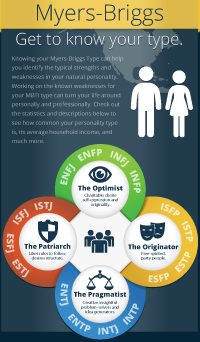Choosing a career can be intimidating due to the multitude of options and possibilities. What should be an exciting, invigorating opportunity can often cause stress. The Myers-Briggs Type Indicator® (MBTI®) is a powerful tool for organizing answers to questions related to career choice, which can devaluate these negative feelings. The MBTI® was founded on Carl Jung’s theory of psychological types. It classifies individuals into 16 categories by considering a number of variables, including how introverted or extraverted a person is, whether they tend to make decisions using emotions or logic, and so on. This assessment was developed by Isabel Myers and Katherine Briggs to induce personal and occupational satisfaction based on Jung’s theories. The Myers-Briggs® Test provides valuable insights that can assist the process of gathering information regarding variant careers and eventually making an occupational decision.
It is important to recognize that there isn’t a one-to-one relationship between MBTI® and careers. No one MBTI® personality type is exactly matched for any career or vice versa. However, there are trends among personality types that advise what type is more propitious for certain careers than others. For instance, an outgoing, extraverted person will probably not be well-suited for a career in laboratory research, which requires many hours working alone. On the other hand, an introvert may not thrive in a highly social-based business or marketing environment where they are asked to meet with groups of individuals throughout the day. The MBTI® provides information that can focus a job search, connect with resources, and generally serve as a guide through the process of finding and deciding on a new career path. Moreover, using the MBTI® results throughout the career exploration process can give incite to how individuals react during each step of the process.
ENTP Personality Types (Extraverted-Intuitive-Thinking-Perceiving) and Career Choice.
ENTPs are quick and alert individuals who excel when they have the opportunity to solve innovative, challenging problems. They are highly resourceful and are excellent at coming up with an extensive number of theoretical solutions and then evaluating how realistic they are. For example, they might consider how practical a possible solution is, including how long it will take, how much it will cost, and how many people are needed to implement it. ENTPs are also highly perceptive and intuitive. Reading people is second nature to them, and their initial feelings about others are rarely misguided. ENTPs have a general ability to easily see patterns and connections that others may not be able to detect. This ability extends to social connections. ENTP personality types are enterprising and resourceful in navigating the social nuances of corporate hierarchies, as well as other systems, and are often able to use subtleties to further their own goals. For example, ENTPs may pick up on which of their superiors is most invested or most able to influence a project and then use this knowledge to ensure that their own contributions are recognized, or their own initiatives are prioritized.

Read about The Myers-Briggs® Test ENTP Personality Types Career Tips and other Occupational Information.
ENTPs are also innovators. They are quickly bored by routine and enjoy experimenting with new ways to accomplish everyday tasks and even exploring new hobbies and interests. In professional life, this tendency often means that ENTPs are at the top of their field. They are often the ones to bring cutting-edge research to board meetings or suggest a new, innovative way of structuring discussions or designing a project. While their ideas are not always successful, in the aftermath of their implementation, ENTPs tend to be mature and objective as they evaluate the strengths and shortcomings of their approach. From an ENTP’s perspective, the only way to continue to improve and make progress in the world is to engage in calculated risks. Often, others perceive ENTP personality types as being spontaneous and adaptable. They are constantly changing approaches and innovation styles, which makes them seem energetic and uninhibited. They also enjoy discussing and debating possibilities. These conversations help ENTPs evaluate theories and possibilities from a theoretical standpoint first before investing the time, energy, and resources needed to make these ideas a reality. That said, ENTPs should be aware of their tendency to focus too much on theory and not on action. This personality type may find themselves getting so caught up in the idea of change or innovation that they forget to implement their carefully thought-out plans. ENTPs should also make an effort to connect with their coworkers. While they may not always be the person to initiate a workplace lunch or retirement party, building relationships with others can help make them a memorable and indispensable contributor to the workplace.
ENTP personality types can be well-suited to a broad range of careers, from architecture, engineering, art, or medicine. This diversity of interest is due to their underlying strengths, such as being creative, analytical problem-solvers capable of coming up with new and inventive approaches to problems. A career’s content or subject area is not as important to ENTPs, what really influences their decisions is how much they will be able to problem-solve in creative ways in that career. They may be equally fulfilled and satisfied whether they are estimating costs for a large project, designing a complex building, or planning the public transportation routes and roadways for a major city. An ENTP might become a director for a commercial art group, an electronics technician, or an expert in sports or media. Another trend for this personality type includes positions in business, healthcare, and education as an executive or manager. Ultimately, all ENTP-specific careers require high-level problem-solving and analytical skills. Some common occupations for an ENTP to choose from are Advertising Sales Agent, Economist, Financial Analyst, Food Scientist & Technologist, General & Operational Manager, Human Resources Manager, Industrial Health & Safety Engineering, Insurance Adjuster, Examiner, or Investigator, Insurance Sales Agent, and Landscape Architect.
ENTP Personality Types Goal Setting and Gathering Information.
The first step in the career exploration process is to set goals. ENTPs set multiple long-term intentions and are able to achieve them only by setting a long-term plan but also by keeping their approach flexible enough to take advantage of unanticipated circumstances and changes. At times this personality type may have less sense of long-term direction when compared to other dichotomies. To stay on task, ENTPs should set intermediate “milestones” or “checkpoints” to ensure that they are progressing in a timely fashion. For example, if the goal is to market a new product, ENTPs might start by brainstorming ideas as well as sketching and developing a prototype. Then, move on to securing funding or investors, and come up with a marketing and business plan before bringing the product to market. As they start to make progress, additional intermediate goals and challenges might emerge. For example, they may need to get bids from various manufacturers before making a final decision or secure office space as they hire additional employees. Once these goals and milestones are established, achieving each one then becomes a challenge and an accomplishment. To do so, ENTP personality types need to gather information and consider their options. This process is often highly social and involves talking to a wide range of people who may be informed and excited about the opportunity. Staying organized is vital to ensure ENTPs’ ability to avoid being overwhelmed by the multitude of possibilities. One strategy is to create a document that outlines their goals, priorities within each goal, and a short list of steps that they need to take to achieve each one. For each step, they should include a list of people to contact and consult. At times, this personality type will neglect important facts about a prospective position due to the consideration of too many career options, so narrowing those of most interest will help focus on an ENTP personality type. Networking will depend on short-term and long-term goals, but the overall strategy is the same: Break large, complex goals into smaller manageable stages and then identify the steps needed to achieve each stage.
ENTP Personality Types and Networking.
Once an ENTP has gathered information and a high-level action plan, implementation follows. ENTPs often have a capacious network of friends and contacts who they can reach out to. This is a great way to get others’ input on how to approach their goal. Building relationships with people who may be able to offer valuable incite is of the utmost importance. These conversations could also point out any areas in which additional expertise is advisable. As ENTPs continue to build relationships, they should be aware of how productive their networking is. They should think about whether the people they are meeting are providing valuable information that can help them reach their goals.
When interviewing, ENTPs will find it natural to give an explanation of their quick learning capacity and potentiality for the future success of an organization, though they should allow their prospective employers time to ask questions during interviews. This personality type has a tendency to speak out of turn and may not be able to gather all of the information needed to heed an informed decision during this process. They should also be aware of the personality types of the people they are meeting with. For example, if an ENTP is in an interview with someone who has a Sensing personality type, they should keep the conversation more concrete, since the interviewer might become overwhelmed if they present too many theoretical ideas.
ENTP Personality Types and Decision-Making.

Read about The Myers-Briggs® Test ENTP Personality Types Career Tips and other Occupational Information
As ENTPs begin to make decisions and commit to a new career or course of action, they will naturally think in a logical and linear fashion: “If I do X, then Y will probably happen,” or “Because I like A and B, I should do C.” ENTPs intuitively weigh pros and cons and often reach logical conclusions quickly. For example, if an ENTP were applying to law school, they might immediately accept an offer from the highest ranking school that admitted them, or from the school that provided the best balance of academic rigor and financial support. However, at times, ENTP personality types should try to look beyond the logical to the emotional. It may aid an ENTP in considering the environment of the new school, as well as the proximity to family and friends. They should also take the time to talk through their options with those who may be affected by their decision. It is common for this personality type to postpone their career decisions, so setting a deadline that is announced to these close friends and family members is advisable. Most importantly, ENTPs should remember when it comes down to it, career changes are about happiness. They should take a step back and make decisions around long-term happiness and fulfillment, not just what makes the most sense in the immediate future.
Learn More About the MBTI ENTP Personality Type
Explore additional information that delves deeper into the ENTP Personality Type by examining various personality and career-based subjects:
- How the MBTI ENTP Type relates to Innovation
- How the MBTI ENTP Type relates to Project Management
- How the MBTI ENTP Type relates to Emotional Intelligence
- How the MBTI ENTP Type relates to Leadership
- How the MBTI ENTP Type Communicates
- How the MBTI ENTP Type relates to Decision Making
Click on the link below to read more about different MBTI Personality Types
| ISTJ | ISFJ | INFJ | INTJ | ESTP | ESFP | ENFP | ENTP |
| ISTP | ISFP | INFP | INTP | ESTJ | ESFJ | ENFJ | ENTJ |
References
Introduction to Type (Isabel Briggs Myers, 1998, CPP Inc.)
Introduction to Type and Careers (Allen L. Hammer, 2007, CPP Inc.)



